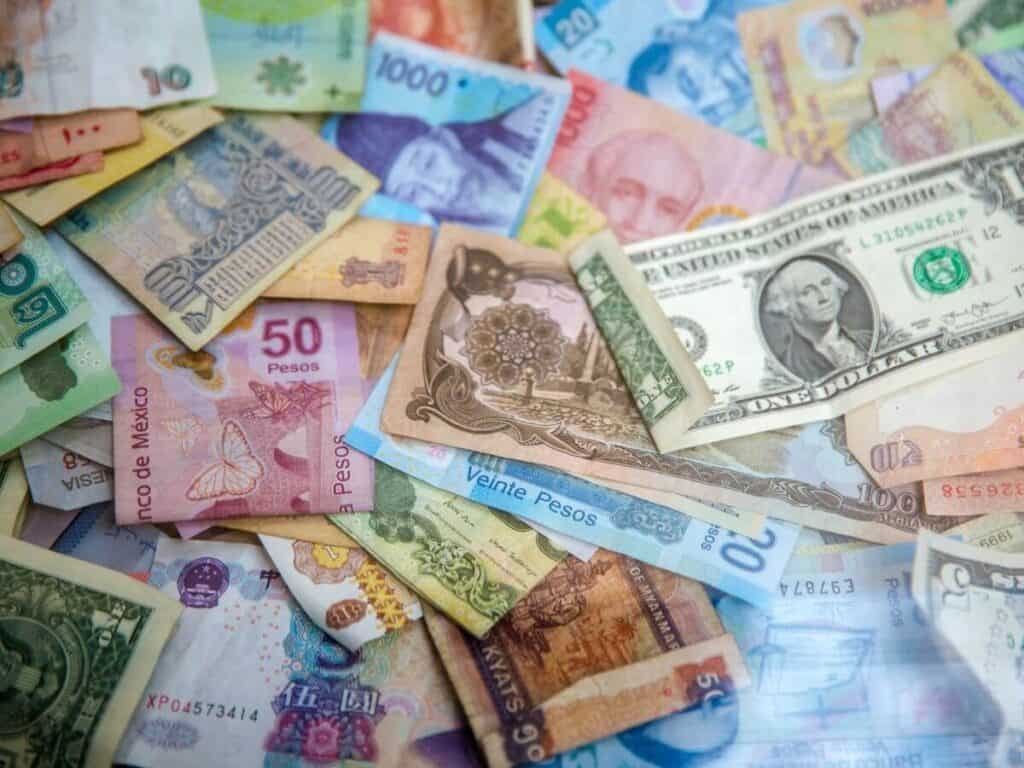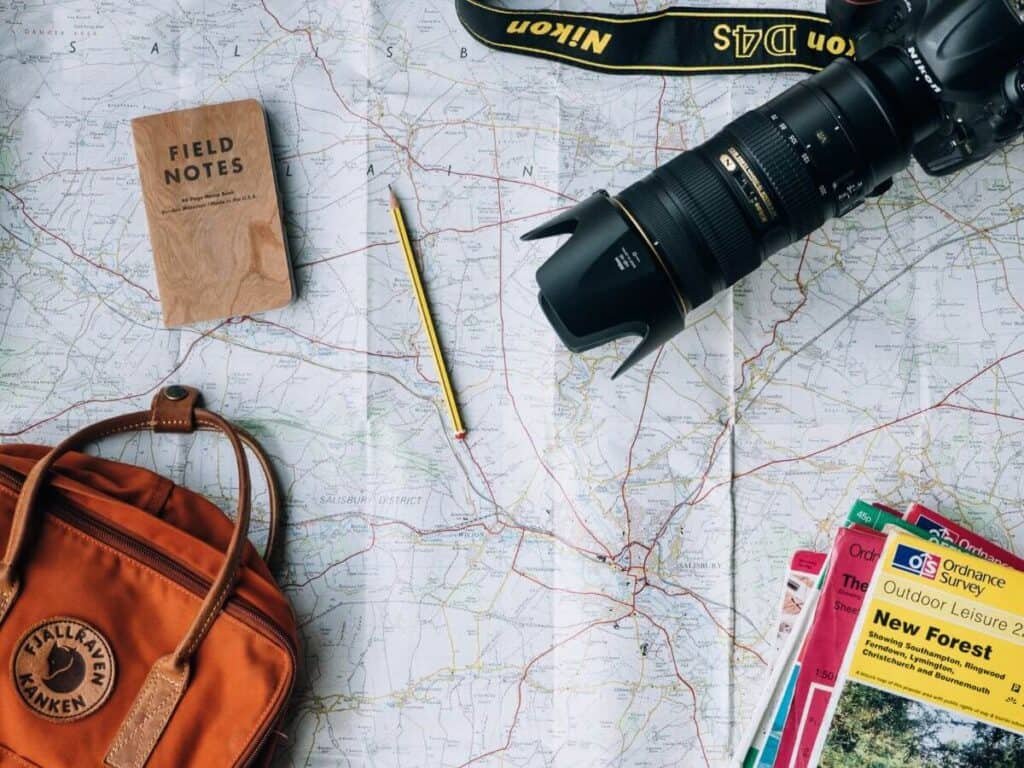Are you looking to explore the world and take on new adventures, but don’t have the funds to do it? Don’t worry – saving for travel doesn’t have to be complicated or overwhelming, here are our tips on how to save for travel.
In this blog, we’ll cover practical tips and strategies to help you save for travel. We will discuss budgeting techniques, ways to cut costs at home, and smart investments that can help grow your travel fund. Whether you want to save for an overseas expedition or a weekend jaunt, these money-saving secrets are key to making sure your travel dreams become reality!

What Is A Travel Budget?
A travel budget is an amount of money that you set aside for your travel-related expenses, such as airfare, accommodation, food, and entertainment. It’s important to set a realistic budget and stick to it when planning your trip so that you can save money and avoid overspending.
What Is The 50 30 20 Budget Rule?
The 50 30 20 budget rule is a popular and simple budgeting technique that helps individuals understand how to manage their money. The rule suggests allocating money as follows: 50% of your income should cover essential expenses like rent, food, and utilities; 30% should go towards discretionary items like shopping and eating out; and the remaining 20% should be saved for investments or long-term financial goals.

How To Save For Travel | 10 Money Saving Strategies
1. Set Your Intention | What’s Your Drive?
What is your main ambition and why are you doing it?
“This year I want to do a round-the-world backpacking trip for 6 months”
My initial drive snuck up on me one day. I was listening to a friend talk about his adventures in Thailand. I was so inspired by his stories that they gave me my first big push towards travelling.
Initially, I just wanted to see new places and have new experiences. My first destination? Thailand. Since then I have spent so much time working, living and travelling around the world.
After learning about different lifestyles and cultures, my big why has changed. 18 years on and I still want to experience as much as possible that the world has to offer. But now I have lived in the mountains, where I found a passion for skiing, snowboarding, hiking and trail running.
I’ve morphed from beach baby to winter baby. I still love my surf and dive trips, but my main focus is on the mountains. If I had never taken that first trip, I may never have discovered that I actually belong somewhere else.
When you figure out what is driving you always keep it in mind. Write it down, set it as the label for your morning alarm, and stick it on the fridge. Wherever you look regularly, have that constant reminder.
Once you know your drive, you have a goal, a target, something to work towards. This will help you focus on your saving target too.

2. Plan A Travel Budget
Once you have determined how much money you want to set aside for travel, create a comprehensive budget with all expected travel expenses included so that you know exactly how much money is available for the trip.
Need help with this? Download our free pdf guide on How To Plan A Budget For Travel.
3. Earn Extra Money To Save For Travel
The only way to fund your trip, (unless someone else is paying for it) is to work. You could work more hours in your current job, get a second job or plan a working holiday along your journey.
- There are so many options for extra income:
- Weekends in retail.
- Evenings in service.
- Cleaning around your working hours.
- Teaching after school. (Maths, Music, Language)
- Virtual assistant online.
- Setting up an online store.
- Become a content creator.
A working holiday allows you to go travelling almost straight away. You are going to work and live in a country, not take an extended holiday. Some countries may pay more for jobs than in your home country.
If you are careful with your earnings they can then fund your onward travel. Or between destinations to your next working location.
Many countries offer a working holiday visa. Usually for people aged 18-30 depending on where you come from. Check the government website of your preferred destination to see if you are eligible.
Applying for a ski/summer season job puts you in the same position. Some employers will also offer accommodation and a lift pass. Triple win if you are hideous at saving.
For help with your ski season search have a look at Season Workers and Ski Jobs.
Read my view on ski season work: The Scary Truth About Seasonal Work
This cuts out the months or years of dreaded saving some travellers have to do. If you are planning on taking an extended amount of time out to travel and not work, then this method won’t work for you. But travelling isn’t a one size fits all lifestyle.
Setting up an online side hustle is also a great way to earn money while travelling, which could ultimately keep you on the road for longer.
This isn’t a must though. You can just as easily save for a long-term trip without taking on an extra job or working along the way. If you are careful with your current income and can cut back on a few things, you will reach your target in a sensible time.
4. Save For Travel By Cutting Back On Spending
Whether you have taken on extra work or not, I advise you to start cutting back on the things that you buy. Not only will this bump up your savings, but it will also help you discipline your spending when on the road.
You don’t need to upgrade your phone, buy the latest Nike trainers, or go to the pub to get smashed every weekend. I know this may seem like the end of the world to some people.
But trust me the experiences you will get while travelling, will be more than worth it. As a lover of clothes and shoes, I still find it quite difficult to live out of 1 suitcase for months at a time. But my love for travel outweighs my love for shoes, by a smidge.
Give Yourself A Cooling-Off Period For Purchases.
Impulse purchasing is one of the main factors behind overspending; give yourself time between seeing something desirable and actually making the purchase so as not to end up regretting it later down the line due to a lack of thought about the financial implications in the moment!
Swap And Borrow Clothes And Household Items.
Find creative alternatives such as sharing resources with friends who also enjoy travelling or swapping household items with family members instead of buying new ones – even second-hand can often do just fine when it comes to clothes, equipment and power tools.
One day you will be looking back on the experiences you have had, not that iPhone once upon a time.

It’s The Small Stuff
Daily things can add up to a big expenditure too. Chain coffee shops, your Friday night takeaway, that glossy box subscription. These are all things you enjoy, but they are not things that you need.
Try to keep your spending down to vitals. You can cook food at home or make your own coffee. How much do you subscribe to each month? Sky, Spotify, Netflix. You will be surprised how much these simple things add up over time. I get that they have become a big part of daily life, but they are not essentials.
Could you move in with family members and save on rent? Would you want to? Perhaps not, but it could save you a small fortune and could be worth considering. Do you own a vehicle? Selling it will raise money towards your trip. It will also save you on tax, petrol, insurance and servicing. These are things I did not miss forking out for.
Look for ways to cut down on your transport costs, can you carpool, is public transport a cheaper alternative for your daily commute?

5. Sell Your Stuff To Save For Travel
Whether you are off on a round-the-world trip or your first summer season, there is only so much you can carry. These possessions will be all you have for some time. If you can live out of one suitcase for 6 months or more, can’t you technically do that all of the time?
I’m not saying buy one suitcase full of clothes and that is it forever. Clothes don’t always last that long and after a while, you will probably get tired of wearing the same things.
So my advice to you would be, to look at what you own and what you can sell. You will be amazed at some of the things you can make money from. It doesn’t matter if you have a huge TV or some old clothes, every penny counts.
Cutting down on your wardrobe can be hard. No doubt you only wear a small number of clothes in your wardrobe. It’s full of items like “Oh I love that top, but I’m not sure if it’s really me”. “I loved that dress 5 years ago, maybe I will wear it again one day”.
I have one word for you. Hoarder. The sooner you shed this burden the better. I have an easy 4-step solution for you.
Step 1
Pull out the clothes you wear regularly, the ones you not only love but also actually wear. They are your keepers.
Step 2
Now in a separate pile, place all of the things you haven’t worn in the last 6-12 months. I understand that some clothes are seasonal. So if it’s summer and you have a stock of winter clothes, put aside the ones you barely wore last winter.
You should now have 2 piles, absolute keepers, and absolute no no’s. Good, now to sort the rest.
Step 3
Do any of the rest of the items fit in with your travels? T-shirts, skirts, flip-flops, ski gear? These may come in handy and save you from buying any new items for your journey. There is a good chance your clothes will get destroyed on the road, laundrettes in Asia will not separate your items and will boil them at approximately 1000 degrees, don’t spend a big budget on shiny new things.
Step 4
Repeat the process with footwear and accessories. You need to be as ruthless as possible. Remember you only have x amount of time before you leave and you can only carry a certain amount.
Are you really going to be in love with those Kappa poppers when you return in 12 months? I hope you were never in love with those Kappa poppers TBH. Yes, I’m speaking from my own 90s teenage shame.
This should leave you with 3 distinct piles:
1: Absolute Keepers. The things you need now until you leave and things you can store for when you return.
2: Travel Items. The things you will take with you.
3: Stuff To Sell. The things going on eBay, Vinted, Depop or the next car boot sale!

6. Set Up A Direct Debit To Your Savings Account
Setting up an automatic transfer from your paycheck or regular income into a savings account designated specifically for travel can help ensure that you are consistently saving toward your goal and not tempted to spend it elsewhere.
7. Don’t Travel On Borrowed Money
Although it can be tempting to borrow money to finance your travels, we do not recommend it. There are two main reasons why you should avoid travelling on borrowed money:
- Interest charges: If you borrow money using a credit card or personal loan to fund your travels, you will be charged interest on the loan amount. This will increase the overall cost of your travel and put you in debt, which could take months or even years to pay off.
- Financial strain: Borrowing money for travel could put a significant financial strain on you, especially if you are not able to repay the loan amount on time. This could affect your credit score and cause difficulties in other areas of your life. Being in debt is stressful, avoid this stress by getting your finances in order before your trip.
8. Save For Travel By Reducing Energy Bills
Try turning off lights when leaving rooms, unplugging appliances when not in use, and taking shorter showers in order to reduce electricity bills while still enjoying creature comforts at home during moments away from travelling; these small changes will add up over time in terms of saved funds!
You can also shop around and compare the prices of other energy companies, sometimes just switching providers can save big.
9. Start Earning Points
Earning air miles and loyalty points is a great way to save for travel and comes with a bunch of other benefits. Here are some of the advantages of earning air miles and loyalty points:
- Free flights and hotel stays: By earning enough air miles and loyalty points, you can enjoy free flights or hotel stays, which could save you a lot of money on your travel expenses.
- Upgrades and perks: Airline loyalty programs often offer upgrades and perks like lounge access, priority boarding, and free checked bags.
- Exclusive rewards and discounts: Some loyalty programs offer exclusive rewards and discounts, such as discounted car rentals, restaurant vouchers, or even special event tickets.
- Boost your status: By earning loyalty points, you can increase your status level with an airline or hotel, which could lead to even more benefits like complimentary upgrades.
To get started with earning air miles and loyalty points, here are some tips:
- Choose your loyalty programs wisely: Start by choosing the loyalty programs that are the most valuable to you based on your travel needs and preferences. The best loyalty programs will also depend on which country you reside in.
- Maximize your earnings: Earn points by using your credit card for as many purchases as possible, including your regular expenditure, like food shopping and bills, booking travel directly with the airline or hotel, or taking advantage of promotions and bonuses.
- Be consistent: Stick to one or two loyalty programs to maximize your earnings and enjoy long-term benefits.
- Pay off your credit card balance: If you use a credit card to earn loyalty points, make sure to pay off your balance in full each month to avoid interest charges.
By following these tips, you can start earning air miles and loyalty points, and enjoy the many benefits that come with it!

10. Stay Disciplined
Whatever your weekly or monthly saving target is, put it out of reach as soon as possible. You can’t save for travel if you’re constantly dipping into those funds. Don’t let your friends fool you for one second that you are going to miss out if you don’t go on that lad’s trip. Imagine the adventures you are about to have!
I can guarantee you one thing, no matter where you go, or how long you are away, NOTHING will change at home. Yes, people will get older; some may get married and have children. But the place won’t change too much; a Friday night out in Liverpool will still be a Friday night out in Liverpool, no matter how long you are away travelling.
How To Save Money On Cheap Travel
- Set a realistic budget and use it when making your travel plans.
- Book flights in advance to get the best deals.
- Look for coupons, discounts and loyalty programs that can save you money.
- Consider alternative transportation options such as trains or buses instead of flying.
- Research accommodation options other than hotels such as hostels or Airbnb rentals.
- Look for cheap or free activities in the destinations you plan to visit – many cities have free walking tours or museums with discounted admission rates for students and seniors!
- Pack light to avoid oversized bag fees at the airport.
- Get cash from ATMs instead of exchanging currency at the airport to save money on conversion fees and exchange rates.
- Carry reusable water bottles and snacks instead of buying them in airports or tourist-heavy areas to avoid inflated prices.
- Use apps to track your progress and keep you motivated – there are great budgeting apps like Mint or YNAB (You Need a Budget) that can help you stay on track with your travel savings goals!

Why Is It Important To Travel On A Budget?
Travelling on a budget is important because it allows you to enjoy your trip without breaking the bank. By setting and sticking to a travel budget, you can save money while still having an enjoyable vacation experience.
Establishing a budget helps you manage your finances while ensuring that you have enough money to cover all of your needs and wants during your trip. Sticking to a budget allows you to continually travel without the worry of generating crippling dept.
The Wrap-Up: How to Save For Travel | The Ultimate Guide
These are the key things that we implement whenever we need to tighten up our budget and save for travel or any other big savings goal.
Top Tip: Save as much as you can. Always make sure you have extra. You never know when it may come in handy, as we all know travelling doesn’t always go to plan. Whether it be for something serious like medical bills, something fun like surfing lessons, or something frivolous like the dress you saw in the shop window, it’s always good to have a bumper in the budget.
Being on a tight travel budget doesn’t mean that you can’t have a few luxuries every now and then. It means that you have to have your spending priorities in the right order. These are our top tips on how to save for travel, we hope they help you reach your next travel budget!